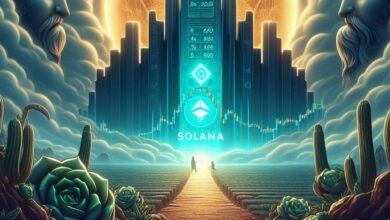Solana: Innovation or Centralization? A Critical Review

Solana has rapidly gained attention within the blockchain and cryptocurrency space for its high-performance network and low transaction costs. However, despite its impressive achievements, the debate surrounding its alleged centralization continues to spark controversy. While many view Solana as a groundbreaking blockchain, others argue that its centralized nature may hinder long-term innovation and adoption. Notably, Edward Snowden, a prominent whistleblower and crypto advocate, has raised concerns about Solana’s design, casting a critical light on its potential future.
Solana’s Performance and Growing Popularity
Solana has made headlines in recent months for several reasons, most notably for its ability to support high-throughput applications at a fraction of the cost of competitors like Ethereum. Investment firms such as VanEck have even predicted that Solana could eventually capture up to 50% of Ethereum’s market share, given its current growth trajectory.
In particular, the platform has been instrumental in facilitating the launch of numerous new tokens, further enhancing its market presence. Projects like Pump.Fun, a meme token launchpad, have contributed to Solana’s growing popularity, with several newly launched tokens experiencing rapid increases in value. This surge has helped Solana establish itself as a hub for innovative projects, despite ongoing concerns about its centralized structure.
Edward Snowden’s Criticism: Centralization Concerns
One of the most significant challenges Solana faces is its perception of centralization. Edward Snowden, a former CIA and NSA contractor turned crypto enthusiast, has voiced strong opinions on the matter. During a recent appearance at Token2049, a major blockchain conference, Snowden stated that Solana’s architecture exhibits significant centralization, a view that has divided the crypto community.
According to Snowden, Solana’s centralized design could stifle future innovation, especially in areas like supply chain management, where decentralization is key to trust and transparency. He pointed out that while Solana’s development team, led by Anatoly Yakovenko, has built an incredibly fast and efficient network, the cost of achieving this speed and low transaction fees is too high in terms of control and decentralization.
The Controversy Around Snowden’s Statements
Snowden’s comments have sparked widespread debate within the blockchain community, particularly among Solana’s staunch supporters. Many disagree with his assessment, arguing that Solana’s approach is necessary to provide a scalable and efficient solution in the current blockchain ecosystem. Others, however, believe that Snowden’s critique highlights deeper issues that may need to be addressed if Solana aims to sustain its momentum.
Snowden has gone so far as to suggest that Solana is primarily used for speculative trading and questionable financial practices, which, in his opinion, detracts from the platform’s potential to drive real-world applications. This criticism aligns with broader concerns about the platform’s centralized validators and the role they play in controlling the network, making it difficult for true decentralization to take root.
The Future of Solana: Balancing Performance and Decentralization
Despite these criticisms, Solana continues to grow, attracting a significant number of developers and projects to its ecosystem. Its high throughput and low costs have made it a popular choice for DeFi applications and NFTs, sectors where Ethereum’s high fees have posed a significant barrier.
Read more Solana’s Price Rebound: A Critical Moment to Avoid the ‘Death Cross
The centralization debate, however, cannot be ignored. For Solana to achieve long-term success and fulfill its potential as a major blockchain player, its core developers may need to address these concerns. Striking a balance between maintaining the platform’s performance advantages while ensuring greater decentralization will be key to its future trajectory.
In conclusion, Solana’s journey is far from over. While it has achieved remarkable growth and is poised to capture a significant share of the blockchain market, the issue of centralization looms large. Whether Solana can resolve these challenges will determine whether it remains a cornerstone of the decentralized world or fades as a victim of its own design choices.
Important Notice: The content presented in this article is intended for informational purposes only and should not be interpreted as financial advice. Coinshibainu.com bears no responsibility for any investment decisions made relying on the information contained herein. It is highly recommended to consult with a qualified expert or financial advisor before making any investment decisions.



